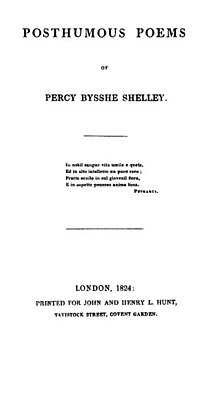Music, When Soft Voices Die: Difference between revisions
No edit summary |
|||
| Line 44: | Line 44: | ||
==Musical Compositions== |
==Musical Compositions== |
||
Many composers and musicians have set the poem to music with vocal accompaniment. Among the composers are [[Charles Wood (composer)| Charles Wood]] as a three-part song in 1915<ref>[http://books.google.com/books?id=PtgiAQAAMAAJ&pg=PA1060&lpg=PA1060&dq=music+when+soft+voices+die+charles+wood+1914&source=bl&ots=_Nd-dcw1Nr&sig=xJ-pM5elz9cARNGG9oIQaQxrFEM&hl=en&sa=X&ei=u-wqT7PtDMiIsQLVzviSDg&ved=0CEAQ6AEwBg#v=onepage&q=music%20when%20soft%20voices%20die%20charles%20wood%201914&f=false Catalog of Copyright Entires, U.S. Library of Congress.]</ref>, [[Frank Bridge]], for mixed chorus a capella, in 1904, [[Eric Nelson (musician)| Eric Nelson]] in 1999, |
Many composers and musicians have set the poem to music with vocal accompaniment. Among the composers are [[Charles Wood (composer)| Charles Wood]] as a three-part song in 1915<ref>[http://books.google.com/books?id=PtgiAQAAMAAJ&pg=PA1060&lpg=PA1060&dq=music+when+soft+voices+die+charles+wood+1914&source=bl&ots=_Nd-dcw1Nr&sig=xJ-pM5elz9cARNGG9oIQaQxrFEM&hl=en&sa=X&ei=u-wqT7PtDMiIsQLVzviSDg&ved=0CEAQ6AEwBg#v=onepage&q=music%20when%20soft%20voices%20die%20charles%20wood%201914&f=false Catalog of Copyright Entires, U.S. Library of Congress.]</ref>, [[Frank Bridge]], for mixed chorus a capella, in 1904, [[Eric Nelson (musician)| Eric Nelson]] in 1999, Sir Charles [[Hubert Parry]] in 1897, Three Songs, Opus 12, [[Ralph Vaughn Williams]] in 1893<ref>[http://www.rvwsociety.com/workschoral.html Ralph Vaughn Williams Society.]</ref>, [[Rebecca Clarke (composer)| Rebecca Clarke]] for mixed chorus in 1907, [[Peter Warlock]] in 1911, [[Henry Cowell]] in 1922, [[Jack Gibbons]], Opus 17, [[Samuel Barber]], for piano and voice in 1926, [[Ernest Gold (composer)|Ernest Gold]]<ref>[http://www.recmusic.org/lieder/get_text.html?TextId=14938 ]</ref>, [[Quincy Porter]] in 1947, and [[Roger Quilter]], for voice and piano, Opus 25, No. 5, in 1927. |
||
== References == |
== References == |
||
Revision as of 00:18, 3 February 2012
| Music, When Soft Voices Die | |
|---|---|
| by Percy Bysshe Shelley | |
 "Music, When Soft Voices Die" first appeared in Posthumous Poems, John and Henry L. Hunt, London, 1824. | |
| First published in | Posthumous Poems |
| Subject(s) | Endurance of the memories of events and of sensations |
| Publisher | John and Henry L. Hunt |
| Publication date | 1824 |
| Lines | 8 |
Music, When Soft Voices Die is a major poem by Percy Bysshe Shelley written in 1821 and first published in Posthumous Poems of Percy Bysshe Shelley in 1824 in London by John and Henry L. Hunt with a preface by Mary Shelley.[1] The poem is one of the most anthologized, influential, and well-known of Shelley's works.[2][3]
Text
Music, When Soft Voices Die
Music, when soft voices die,
Vibrates in the memory;
Odours, when sweet violets sicken,
Live within the sense they quicken.
Rose leaves, when the rose is dead,
Are heap'd for the belovèd's bed;
And so thy thoughts, when thou art gone,
Love itself shall slumber on.
Summary
The poem was published as "To---" in 1824 under Miscellaneous Poems in two stanzas of four couplets each containing four lines in Posthumous Poems. The theme of the poem is the endurance of the memories of events and of sensations.[4] Mary Shelley edited the poems and wrote the preface to the collection. She described the poems: "Many of the Miscellaneous Poems, written on the spur of the occasion, and never retouched, I found among his manuscript books, and have carefully copied: I have subjoined, whenever I have been able, the date of their composition."[5][6][7][8]
Musical Compositions
Many composers and musicians have set the poem to music with vocal accompaniment. Among the composers are Charles Wood as a three-part song in 1915[9], Frank Bridge, for mixed chorus a capella, in 1904, Eric Nelson in 1999, Sir Charles Hubert Parry in 1897, Three Songs, Opus 12, Ralph Vaughn Williams in 1893[10], Rebecca Clarke for mixed chorus in 1907, Peter Warlock in 1911, Henry Cowell in 1922, Jack Gibbons, Opus 17, Samuel Barber, for piano and voice in 1926, Ernest Gold[11], Quincy Porter in 1947, and Roger Quilter, for voice and piano, Opus 25, No. 5, in 1927.
References
- ^ Shelley, Percy Bysshe. Posthumous Poems. London: John and Henry L. Hunt, 1824, p. 214.
- ^ Quiller-Couch, Arthur, ed. The Oxford Book of English Verse: 1250–1900. Oxford: Oxford University Press, 1919.
- ^ Palgrave, Francis T., ed. The Golden Treasury of the Best Songs and Lyrical Poems in the English Language, selected and arranged with notes by Francis Turner Palgrave. London: Macmillan, 1875.
- ^ Havens, Raymond D. "Structure and Prosodic Pattern in Shelley's Lyrics". PMLA, Vol. 65, No. 6 (December, 1950), pp. 1076-1087.
- ^ Shelley, Percy Bysshe. Posthumous Poems. London: Hunt, 1824.
- ^ Massey, Irving. "Shelley's 'Music, When Soft Voices Die': Text and Meaning." The Journal of English and Germanic Philology, Vol. 59, No. 3 (July, 1960), pp. 430-438.
- ^ Unterecker, John. "Shelley's 'To ---(Music, When Soft Voices Die')." Explicator, XV (1957), item 26.
- ^ Hirsch, E. D., Jr. "Further Comment on 'Music, When Soft Voices Die'." The Journal of English and Germanic Philology, Vol. 60, No. 2 (April, 1961), pp. 296-298.
- ^ Catalog of Copyright Entires, U.S. Library of Congress.
- ^ Ralph Vaughn Williams Society.
- ^ [1]
